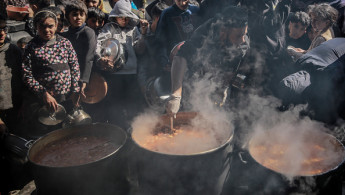UN says Israel 'systematically' blocking Gaza aid access
Israeli forces are "systematically" blocking access to people in Gaza, complicating the task of delivering aid in what has become a lawless war zone, the United Nations said on Tuesday.
It has become nearly impossible to evacuate the sick or wounded and deliver aid in northern Gaza and increasingly difficult in the south, said Jens Laerke, spokesman for the UN humanitarian agency OCHA.
All planned aid convoys into the north have been denied by Israeli authorities in recent weeks.
The last allowed in was on January 23, according to the World Health Organization.
Even convoys cleared in advance with Israeli authorities have been blocked or come under fire.
Laerke pointed to an incident on Sunday, when a convoy to evacuate 24 patients from the besieged Al Amal hospital in the southern city of Khan Younis -- jointly organised by the WHO and Palestinian Red Crescent (PRCS) -- was blocked for seven hours and paramedics detained.
"Despite prior coordination for all staff members and vehicles with the Israeli side, the Israeli forces blocked the WHO-led convoy for many hours the moment it left the hospital," Laerke told journalists in Geneva.
"The Israeli military forced patients and staff out of ambulances and stripped all paramedics of their clothes," he said.
The convoy had to leave another 31 patients behind at Al-Amal, which is no long functioning after suffering 40 attacks in the past month alone that have killed at least 25 people.
"Three PRCS paramedics were subsequently detained, although their personal details had been shared with the Israeli forces in advance," Laerke said. Just one has been released.
"This is not an isolated incident," he stressed.
"Aid convoys have come under fire and are systematically denied access to people in need (meaning) humanitarian workers are subject to unacceptable and preventable risk."
The PRCS said it was suspending operations in Gaza for 48 hours because Israel has failed to ensure the safety of its emergency medical teams.
Laerke said the UN would continue to remind Israeli forces they had an obligation, at a minimum, to facilitate "safe, smooth and rapid passage" when alerted to aid missions.
Two human rights groups on Monday also accused Israel of further limiting humanitarian aid into Gaza despite an order from the UN's top court.
February registered a 50% reduction of humanitarian aid entering #Gaza compared to January.
— Philippe Lazzarini (@UNLazzarini) February 26, 2024
Aid was supposed to increase not decrease to address the huge needs of 2 million Palestinians in desperate living conditions. Among the obstacles: lack of political will, regular closing…
The International Court of Justice in The Hague exactly one month ago said Israel must do everything to prevent genocidal acts in the besieged territory. It must also take "immediate and effective measures" for aid provision, the ICJ said.
But Israeli authorities have "failed to take even the bare minimum steps to comply" with the ICJ ruling issued on January 26, Amnesty International said.
Both Amnesty and Human Rights Watch (HRW) said the number of aid trucks entering Gaza had actually decreased by roughly one-third since the ruling, which came in a case brought by South Africa accusing Israel of breaching the UN Genocide Convention.
"The Israeli government is starving" Gaza's 2.4 million Palestinians, "putting them in even more peril than before the World Court's binding order," said Omar Shakir, HRW's Israel and Palestine director.
"The Israeli government has simply ignored the court's ruling, and in some ways even intensified its repression, including further blocking lifesaving aid."
ICJ rulings are legally binding but the court has no enforcement mechanism.
The United Nations agency for Palestinian refugees, UNRWA, said there was a "50 percent reduction" in humanitarian aid entering Gaza during February compared to January.
"Aid was supposed to increase not decrease to address the huge needs of two million Palestinians in desperate living conditions," UNRWA chief Philippe Lazzarini said on X, formerly Twitter.
He said a lack of political will and regular closing of border crossing points were among the reasons.
The war in Gaza began after an attack by Palestinian group Hamas on October 7 that resulted in the deaths of around 1,160 people in Israel, according to Israeli figures.
They took about 250 hostages, 130 of whom remain in Gaza, according to Israel.
Israel's relentless military offensive has killed at least 29,878 people in Gaza, mostly women and children, according to its health ministry.
The situation in the densely populated Palestinian territory is increasingly desperate.
Laerke said UN aid trucks, which travel without armed guards, are often stopped as soon as they cross into Gaza by crowds of people desperate for food and other aid.
"Desperate people take what they can," he said.
But gangs also appeared to be taking aid which later turned up on the black market, he added, warning of an "increasing breakdown of civil order inside Gaza".




 Follow the Middle East's top stories in English at The New Arab on Google News
Follow the Middle East's top stories in English at The New Arab on Google News

![A group of Palestinians, foreign and Israeli activists gather to participated in an olive picking event on the land in the town of Battir, which is under threat of confiscation by Israel in Bethlehem, occupied West Bank on 8 November 2024. [Getty]](/sites/default/files/styles/image_330x185/public/2182930803.jpeg?h=199d8c1f&itok=__0LgGsa)
